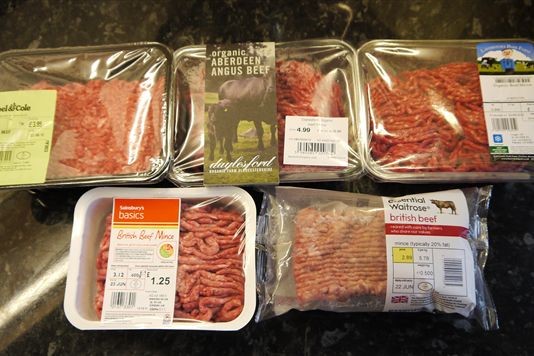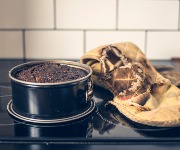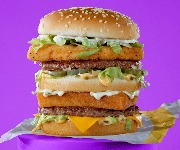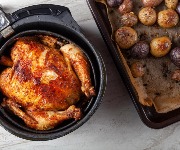Basic Britain: beef mince

In the first of a new series, Laura Rowe takes a look at everyday ingredients and decides how supermarket budget ranges stand up to the brands.
When we’re in the midst of the UK’s second recession in a decade, shopping for the ‘finest’ ingredients is not always an option. Where once the ‘big four’ reined, now budget supermarkets such as Aldi and Lidl are proving worthy competitors.
So how do you compete (and indeed shop) in such a marketplace? You strip back, you cut costs, you go basic. But what compromises are we making when we downgrade? Can we really ‘taste the difference’? Lovefood.com will be investigating the real difference between the budget ranges of staple groceries and the brand leaders. First up, that cheapest and most versatile of everyday meats – beef mince.
Meat your maker
 Just as (bad) sausages are renowned for using all the unwanted bits of an animal, beef mince can also vary wildly in quality. The ideal, of course, is that the ground meat is just that; meat, with a portion of fat to act as a natural baster and booster of flavour. But you can also find everything from skeletal and connective tissue to bone and cartilage – anyone else getting flashbacks of the turkey twizzler? UK government guidelines currently state that minced meat must not include meat containing bone fragments or skin, meat of the head, mechanically separated meat or scrap cuttings or trimmings. Instead, it must derive from fresh meat, skeletal muscle and any adherent fatty tissues.
Just as (bad) sausages are renowned for using all the unwanted bits of an animal, beef mince can also vary wildly in quality. The ideal, of course, is that the ground meat is just that; meat, with a portion of fat to act as a natural baster and booster of flavour. But you can also find everything from skeletal and connective tissue to bone and cartilage – anyone else getting flashbacks of the turkey twizzler? UK government guidelines currently state that minced meat must not include meat containing bone fragments or skin, meat of the head, mechanically separated meat or scrap cuttings or trimmings. Instead, it must derive from fresh meat, skeletal muscle and any adherent fatty tissues.
I tested five different minces as part of this feature, produced by Laverstoke Park; Daylesford Organic Farm; Abel & Cole; Sainsbury’s Basic; and Essential Waitrose. Laverstoke Park claims to use “combinations of cuts of primal, excluding head meat, offal or any mechanically recovered meat”. Daylesford say their mince is “made up of many different cuts and parts of the animal [...] a mixture of trim, whole muscle and a small amount of fat”. Sainsbury’s uses “off cuts of beef produced from the fore and hind quarter”, while Abel & Cole and Waitrose were unable to give specific details.
Face the fats
 One of most common problems with beef mince is excess fat – this, of course, is because fat is cheaper than meat. I weighed all of my minces before cooking, then weighed them again after browning and measured the amount of fat and juice left in the pan. Essential Waitrose (which states on its packaging that it has “typically 20% fat”) produced the greatest grease with around 80ml fat and 20ml natural juices once cooked. Daylesford Farm, which uses only 5% fat in its mince, had approximately 50ml fat, 50ml juices. Sainsbury’s Basic which has 20% fat made 50ml of pure fat and no juices. Abel & Cole produced only around 50ml of liquid (about 2/3 of which were fat). While Laverstoke, which is said to use 12% fat, had the least in my test with only 25ml fat and 25ml juices.
One of most common problems with beef mince is excess fat – this, of course, is because fat is cheaper than meat. I weighed all of my minces before cooking, then weighed them again after browning and measured the amount of fat and juice left in the pan. Essential Waitrose (which states on its packaging that it has “typically 20% fat”) produced the greatest grease with around 80ml fat and 20ml natural juices once cooked. Daylesford Farm, which uses only 5% fat in its mince, had approximately 50ml fat, 50ml juices. Sainsbury’s Basic which has 20% fat made 50ml of pure fat and no juices. Abel & Cole produced only around 50ml of liquid (about 2/3 of which were fat). While Laverstoke, which is said to use 12% fat, had the least in my test with only 25ml fat and 25ml juices.
Value for money
 One area that seems to vary with cost is the “peach pad” aka the “meat nappy”, which is used to soak up any excess blood. In the more expensive minces, this pad was made from a thick paper and was stuck to the plastic containers. At the cheaper end, the pad was very thin and with the Abel & Cole mince in particular, actually stuck to the meat and was hard to peel away. Essential Waitrose also makes a saving with its ‘flow-wrap’ bag packaging, rather than the solid plastic containers chosen by the other brands. This is a 70% reduction in packaging according to the supermarket, and it doesn’t seem to affect the meat negatively in any way. Daylesford Organic and Laverstoke Park justify their price points by the fact that the meat is organic, and therefore takes longer to rear. They make welfare top of their agendas, ensuring traceability and quality, as well as good packaging. Abel & Cole, while not organic, does let you see the source of the meat online. Waitrose claim to use only “prime British beef from Waitrose-farm-assured known producers, from cattle that is under 30 months and reared on a high forage-based diet”. All Sainsbury’s could tell me is that it is British or Irish beef.
One area that seems to vary with cost is the “peach pad” aka the “meat nappy”, which is used to soak up any excess blood. In the more expensive minces, this pad was made from a thick paper and was stuck to the plastic containers. At the cheaper end, the pad was very thin and with the Abel & Cole mince in particular, actually stuck to the meat and was hard to peel away. Essential Waitrose also makes a saving with its ‘flow-wrap’ bag packaging, rather than the solid plastic containers chosen by the other brands. This is a 70% reduction in packaging according to the supermarket, and it doesn’t seem to affect the meat negatively in any way. Daylesford Organic and Laverstoke Park justify their price points by the fact that the meat is organic, and therefore takes longer to rear. They make welfare top of their agendas, ensuring traceability and quality, as well as good packaging. Abel & Cole, while not organic, does let you see the source of the meat online. Waitrose claim to use only “prime British beef from Waitrose-farm-assured known producers, from cattle that is under 30 months and reared on a high forage-based diet”. All Sainsbury’s could tell me is that it is British or Irish beef.
The taste test
![]() So if you pay more, do you automatically get a better flavour? Well, yes, mostly. Daylesford (£4.99/500g), Abel & Cole (£3.99/500g) and Laverstoke Park (£4.40/500g) all tasted the best, without doubt. There was a natural sweetness with each that was lacking in the Waitrose batch (£2.89/500g). Sainsbury’s Basic (£1.25/400g), on the other hand, tasted bland and left an unpleasant aftertaste. But the biggest difference was the texture of the minces. Daylesford (made using organic Aberdeen Angus cattle) was best – firm, tender, smooth, no gristle. Laverstoke Park (again organic Angus) was next best and had a mouthwatering juiciness to the meat. Abel & Cole was a close contender. Essential Waitrose was chewier and had the odd fleck of gristle but was on the whole quite good, while Sainsbury’s Basic was really not great. It sadly took serious effort to chomp through it and when I made it into a burger, with a little egg to bind, it became paste-like and sticky (unlike the Laverstoke burger I made to the same method). The Sainsbury’s Basic mince fried simply or as a pattie was unpleasantly grainy with lots of gristle.
So if you pay more, do you automatically get a better flavour? Well, yes, mostly. Daylesford (£4.99/500g), Abel & Cole (£3.99/500g) and Laverstoke Park (£4.40/500g) all tasted the best, without doubt. There was a natural sweetness with each that was lacking in the Waitrose batch (£2.89/500g). Sainsbury’s Basic (£1.25/400g), on the other hand, tasted bland and left an unpleasant aftertaste. But the biggest difference was the texture of the minces. Daylesford (made using organic Aberdeen Angus cattle) was best – firm, tender, smooth, no gristle. Laverstoke Park (again organic Angus) was next best and had a mouthwatering juiciness to the meat. Abel & Cole was a close contender. Essential Waitrose was chewier and had the odd fleck of gristle but was on the whole quite good, while Sainsbury’s Basic was really not great. It sadly took serious effort to chomp through it and when I made it into a burger, with a little egg to bind, it became paste-like and sticky (unlike the Laverstoke burger I made to the same method). The Sainsbury’s Basic mince fried simply or as a pattie was unpleasantly grainy with lots of gristle.
Would you ever go supermarket-own for beef mince? Do you have different standards with beef steak? Let us know in the comments box below.
You might also like
Best of three: Salad dressings
Best of three: Tomato and basil pasta sauces
Most Recent
Comments
Be the first to comment
Do you want to comment on this article? You need to be signed in for this feature








